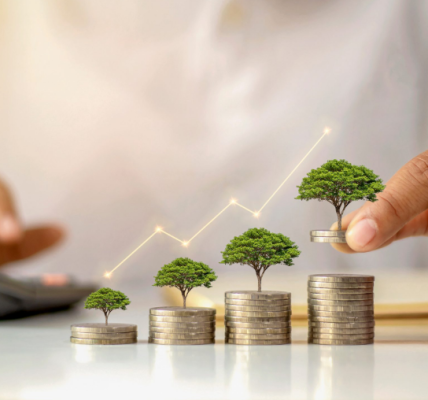We would like to take this opportunity to welcome you to the fascinating world of sustainable finance trends, where innovation and impact come together, and where investors have the chance to make a difference while also earning rewards. In this all-encompassing book, we will delve deeply into the most recent advancements in sustainable finance and investigate the ways in which these advancements are transforming the landscape of investment opportunities. Participate with us as we ride the wave of change and discover the most cutting-edge trends in sustainable finance that are now occurring.
Sustainable Finance Trends: A Deep Dive into the Latest Innovations
As people become more aware of the significance of environmental, social, and governance (ESG) concerns in the process of making investment decisions, the rapid evolution of sustainable finance trends is being propelled forward. A growing number of investors are incorporating environmental, social, and governance (ESG) concerns into their investing strategies as they become more aware of the potential risks and opportunities connected with these factor categories. The evaluation and management of investments are undergoing a fundamental transition as a result of the acknowledgment of the significance of environmental, social, and governance (ESG) factors. These are some of the most recent breakthroughs that are having a significant impact on the subject of sustainable finance, and we will go deeper into some of them in this article. The introduction of green bonds and the increasing popularity of impact investment are two examples of these advances. The term “green bonds” refers to financial instruments that are issued for the purpose of financing projects that have positive effects on the environment.
These projects may include eco-friendly infrastructure or renewable energy efforts. Through the purchase of green bonds, investors have the opportunity to not only earn financial returns but also support programs that improve the environmental sustainability of the world. On the other hand, impact investing is centered on the generation of good social and environmental impact in addition to financial benefits. The goal of impact investors is to provide financial support to organizations and projects that are working to address urgent social and environmental issues, such as the reduction of poverty, the promotion of education, and the development of sustainable energy. Innovative methods to sustainable finance are gaining popularity among investors who are looking to align their investment portfolios with their beliefs and contribute to positive social and environmental consequences. These investors are looking to match their portfolios with their ideals. As the field of sustainable finance continues to develop, it is anticipated that the aforementioned tendencies will play an increasingly significant role in determining the future of finance and investment.
Unlocking Opportunities in Sustainable Investment
An increasing number of investors are recognizing the potential of sustainable investments to deliver not only financial returns but also positive social and environmental impacts. As awareness grows about the interconnectedness of financial markets, social well-being, and environmental sustainability, investors are seeking opportunities to align their investment portfolios with their values and make a meaningful contribution to a more sustainable future. This shift in investor mindset has led to a growing demand for sustainable investments across various asset classes, including stocks, bonds, and alternative investments.
Investors now have a wide range of options to choose from when it comes to sustainable investments, allowing them to tailor their portfolios to reflect their personal values and objectives. Whether it's investing in companies with strong environmental practices, supporting renewable energy projects, or allocating capital to social impact initiatives, there are numerous avenues for investors to make a positive impact while also earning competitive financial returns. Sustainable investments offer the potential to generate long-term value by addressing pressing social and environmental challenges, such as climate change, resource scarcity, and social inequality. By directing capital towards companies and projects that prioritize sustainability and social responsibility, investors can drive positive change and contribute to the transition to a more sustainable and equitable global economy. As the demand for sustainable investments continues to grow, it is expected that these trends will play an increasingly significant role in shaping the future of finance and investment.
Integrating Environmental, Social, and Governance Factors
The incorporation of environmental, social, and governance (ESG) considerations into investment research and decision-making has emerged as a fundamental component of sustainable finance. Investors are able to acquire a more thorough picture of the long-term sustainability and resilience of their assets if they take into consideration these characteristics in addition to typical financial indicators. Social aspects include concerns like as labor practices, diversity and inclusion, and community engagement, whereas environmental factors may include a company's carbon footprint, energy efficiency, and resource usage. Environmental factors may also include the utilization of resources. Different governance variables, on the other hand, concentrate on the structure and control of a company's management.
These governance factors include the makeup of the board of directors, executive compensation, and transparency. When investors incorporate environmental, social, and governance (ESG) factors into their investment analysis, they make it easier for themselves to evaluate the opportunities and risks connected with their investments and to make decisions that are more informed. Investors are able to discover companies and assets that are better positioned to address environmental, social, and governance concerns and deliver sustainable long-term value when they take what is known as a holistic approach to investment management. Additionally, investors have the ability to influence good change and contribute to the evolution of sustainable business practices if they position their assets in accordance with their beliefs and goals. It is anticipated that the incorporation of environmental, social, and governance (ESG) elements into investment decision-making will become increasingly prevalent as awareness of ESG issues continues to develop. This will have a significant impact on the future of finance and investing.
Making a Difference While Generating Returns
Investors have the ability to generate financial rewards while simultaneously making a genuine difference in tackling important social and environmental concerns through the practice of impact investing. Impact investors are able to drive genuine change and build a society that is more sustainable by channeling cash toward projects and organizations that have the potential to generate a positive impact.
Navigating the Ever-Changing Landscape of Sustainable Finance Trends
Investors are required to manage a constantly moving landscape that is characterized by innovation, regulation, and change market dynamics as sustainable finance trends continue to evolve. In an ever-changing market, where investors are looking to capitalize on emerging possibilities and reduce potential risks, it is essential to maintain a high level of knowledge and adaptability in order to achieve success.
Conclusion
As we come to the close of our investigation of the most recent developments in sustainable finance, it is abundantly obvious that the future of finance will be sustainable. There have never been more options for investors to link their financial goals with their principles than there are today, thanks to the proliferation of green bonds and impact investing. Investors have the ability to ride the tide of change and contribute to a society that is more sustainable and equitable for future generations if they remain informed, embrace innovation, and take action.





